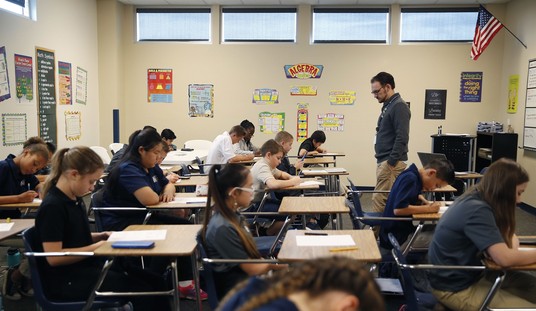The subject: China.
I attended a debate on the question of whether “The US Alliance is our [Australia’s] best defence” at the City Recital Hall in Sydney. For the affirmative were US Ambassador Jeffrey Bleich and Katherine Ziesing, the editor of the Australian Defence Force Magazine. Facing them were Professor Zhu Feng, Deputy Director of the Centre for International and Strategic Studies at Peking University and — the big surprise — retired Major General Jim Molan for the negative. Molan was the Chief of Operations in Iraq during 2004 and 2005. Molan is rumored to have the ear of the opposition, who are tipped to defeat Kevin Rudd when elections are held in a few month’s time.
Molan was the surprise advocate for the negative. I knew him to be, from having attended a dinner at which he spoke, a passionate believer in the positive nature of the United States and an unabashed admirer of the US armed forces, many of whom served under him in his Iraq coalition position. My surmise about his presentation proved correct, as will later be described.
The debate was recorded by the BBC and readers can probably watch it in its entirety when it is presented in the coming weeks. The moderator announced the pre-debate poll of the audience, which packed the auditorium. The numbers going in were 36% for, 30% against and the balance undecided. Yes and No were roughly tied. Could the debaters alter the audience’s perceptions?
The opening was delivered by Ambassador Jeffrey Bleich who was every inch the charming advocate for United States. He was funny and eloquent and thus armed almost managed to pull off depicting the situation in the Pacific as if there were no tensions with China worth mentioning. The main problems, Bleich said, were fundamentally ones of growth arising from increased resource competition, driven by a burgeoning prosperity and threats from non-state actors who were intent on harm “because they hate our way of life”. But where Beijing was concerned, Bleich emphasized, there was no rivalry as such.
Unfortunately for Bleich this sunny impression was rudely shattered by Professor Zhu Feng, who when his turn came to speak described his nervousness at having to fly over so many US military bases ringing China on his way to Sydney. He described without hesitation or equivocation the deep suspicion in China at what he perceived was the military buildup in the Pacific which many Chinese saw as “containment”. In stark contrast to Bleich’s humorous delivery, the Professor warned that Beijing would take a dim view of any attempts to reopen US bases in the Philippines and indeed, any further attempt to add to the cordon of steel that the Chinese leadership felt was stifling them.
He pointedly told the Australian audience that China was that country’s biggest trading partner. Would it not be better, he asked, if Australia put aside the strategy of alliance and relied upon trade? Was it not better after all, to be China’s friend?
The next speaker for the affirmative, Katherine Ziesing, was the first to emphasize that Australia was wholly dependent on sea lanes of communication which it was powerless to secure. That — and she looked at Zhu — was why defense was not provocation. She reeled off statistics describing the vast tonnages that flowed through the South China Sea and the straits between China and Japan and noted that without the United States, Australia would not have a snowball’s chance in hell of guaranteeing its own security. Hence, she closed, an alliance with America is Australia’s best defense.
But her presentation, though eloquent, reasoned and factual was the undercard. Everyone was waiting for Molan to answer the persuasive Bleich.
Molan, as I knew, could be as good a speaker as Bleich. And he was. He began by demolishing every Leftist characterization of America; he described the US Armed Forces as the finest and most moral fighting force on the face of the planet. And having cleared the underbrush with fire and scythe he delivered his punchline: in all this — through the Cold War to the Present — Australia had been a free rider and every prospect of remaining a free rider. Turning to the audience he said isn’t that what most of the world wants to do? Fight to the last American soldier? You know it’s true, he said. You could hear a pin drop. And this attitude is not worthy of Australia, he added.
Because the day comes, Molan argued, as it came when an earlier generation relied on Britain in the 1940s — when the moocher can’t mooch any more. When he has to buy his own drinks. And history teaches that sooner or later the day comes. The long dolorous annals of mankind show that “peace is just the interval when governments are busy reloading”. Hence the only safe bet is to shift for yourself. Or be ready to.
You can fight alongside America, he said, without being a moocher. And far better to enter an alliance with something in hand, rather than show up expecting to come along for the ride. Hence he closed, “America is not Australia’s best defense. Australia is Australia’s best defense.” Let us fight alongside America for preference, he said, but at all events be ready to fight alone. On that note, he closed.
The rest of the debate was anti-climatic, expended in watching the speakers, including Professor Zhu, fend off the strange and bizarre questions put to the panel by the World Socialist Alliance or the Free Julian Assange movement some of whom refused to shift from the microphone when their time was up. There was a moment of comic relief when Professor Zhu was asked who China was relying on to stop North Korea and he readily answered, “the United States.” Everybody relied on the United States, he said, adding that even China prospered under its benign hegemony. But the time had come, Zhu reiterated, to give China its due, a message he emphasized over and over again.
Jeffrey Bleich, a lawyer in his past life, was worth every penny as an advocate. He was adept at parrying the wilder suggestions from the audience, including allegations from one who believed that 9/11 was faked like the moon landing. He was masterful at reminding the audience of how much Australians shared with America. As a pitchman Bleich is exemplary. But his basic policy position, which was to completely downplay the rivalry with China, proved his undoing. The urgency with which Molan urged an Australian buildup and the frank expression of China’s suspicion was too strong to be wholly dispelled by the Ambassador’s manner.
There was a problem and Jeffrey Bleich for all his charm wasn’t facing it, rather doing his level best to draw attention away from it.
At the conclusion of the debate a repolling showed a dramatic shift. The “Nos” had grown from 30% to over 50%. From rough equality the negative had swept the field. In the post debate analysis among friends it was remarked that most people understood that Molan wasn’t really arguing against a US alliance. Rather he was arguing for Australia’s participation as an adult, which meant in terms Molan described in the debate, spending at least 2% of its GDP on defense.
If this debate is any bellweather of public opinion, the probable conclusion to draw is that the region fears that America can no longer hold the ring. The moderator asked Molan if he considered Japan a free rider. The retired general offered if you consider the relevant aspects of the Japanese military, such as the airforce, the BMD and its Navy, it’s quite big. It is not clear that Japan is a free rider in that context. But when you look at Australia’s unbalanced force mix, there is no other conclusion one can reach except that it is. This suggests that if Tony Abbott defeats Labor in the next elections, there could be a chance that Australia will up its military expenditures. That is after all, what other countries in the region have been doing. By following suit, Australia will not be doing anything new. It is just late to the party.
But that’s a contingency predicated on a possibility. Remember that the World Socialist Alliance the Free Julian Assange movement can vote too.
(For a backgrounder into the regional strategic situation, read my pamphlet Storm Over the South China Sea $0.99)
Did you know that you can purchase some of these books and pamphlets by Richard Fernandez and share them with you friends? They will receive a link in their email and it will automatically give them access to a Kindle reader on their smartphone, computer or even as a web-readable document.
The War of the Words for $3.99, Understanding the crisis of the early 21st century in terms of information corruption in the financial, security and political spheres
Rebranding Christianity for $3.99, or why the truth shall make you free
The Three Conjectures at Amazon Kindle for $1.99, reflections on terrorism and the nuclear age
Storming the Castle at Amazon Kindle for $3.99, why government should get small
No Way In at Amazon Kindle $8.95, print $9.99
Storm Over the South China Sea $0.99, how China is restarting history in the Pacific
Tip Jar or Subscribe or Unsubscribe










Join the conversation as a VIP Member